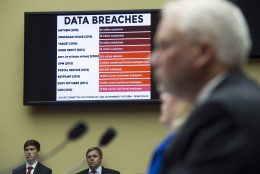Education Department
-
The departments of Agriculture, Commerce, Treasury, Labor and Education and the U.S. Agency for International Development asked Congress in their fiscal 2021 budget requests to use money saved from other programs for IT modernization initiatives.
February 17, 2020 -
In today's Federal Newscast, two prominent universities are being investigated by the Education Department for their relationships with foreign governments.
November 29, 2019 -
The Education Department changed its telework policy last year, requiring most employees to show up to the office at least four days a week, which the agency justified as an effort to “enhance collaboration."
November 28, 2019 -
Chief information officers at two agencies that received higher overall marks on their FITARA scorecards this year have tole members of the House Oversight and Reform Committee that efforts to move to the cloud have led to greater efficiencies and cost savings.
July 02, 2019 -
The Homeland Security and Governmental Affairs Subcommittee on Investigations’ report on the cybersecurity at eight agencies highlights systemic problems over the last decade and offers several recommendations.
July 01, 2019 -
In today's Federal Newscast, a new report from a Senate committee shows at least eight cabinet agencies are failing to comply with federal cybersecurity standards.
June 26, 2019 -
The Interior Department is the latest agency to make changes to its telework program within the past year.
June 20, 2019 -
At least one department is implementing a new limit on telework for some employees during the summer Metro closures. The Agriculture Department isn't lifting its limit on telework during the Metro construction but has encouraged employees to consider flexible and alternative work schedules.
May 29, 2019 -
Higher ed and credit union lending show the promise and peril of federal financial involvement.
May 21, 2019 -
Federal Chief Information Officer Suzette Kent said the new white paper from ACT-IAC helps bring together multiple federal cyber efforts under the zero trust umbrella.
May 17, 2019 -
NIST Director Walter Copan and FEMP Director Rob Ivester spoke with Federal Drive with Tom Temin about their collaborative solar energy efforts.
May 01, 2019 -
Participation in federal telework programs fell slightly in 2017, according to the latest data from the Office of Personnel Management's report to Congress.
April 29, 2019 -
The departments of the Air Force, Education and Homeland Security are all in the process of transitioning public facing functions into digital applications. Each has a broad customer base with very specific needs that need to be taken into account to provide a good customer experience.
March 22, 2019 -
Attracting in-demand cybersecurity talent to government service could be as simple as retraining current federal employees for the jobs of the future.
March 22, 2019 -
The Trump administration’s 2020 budget proposal for government spending gives a big boost to the Pentagon and other security-related agencies, while calling for a cut of more than $2.7 trillion in federal civilian spending over the next ten years.
March 12, 2019















